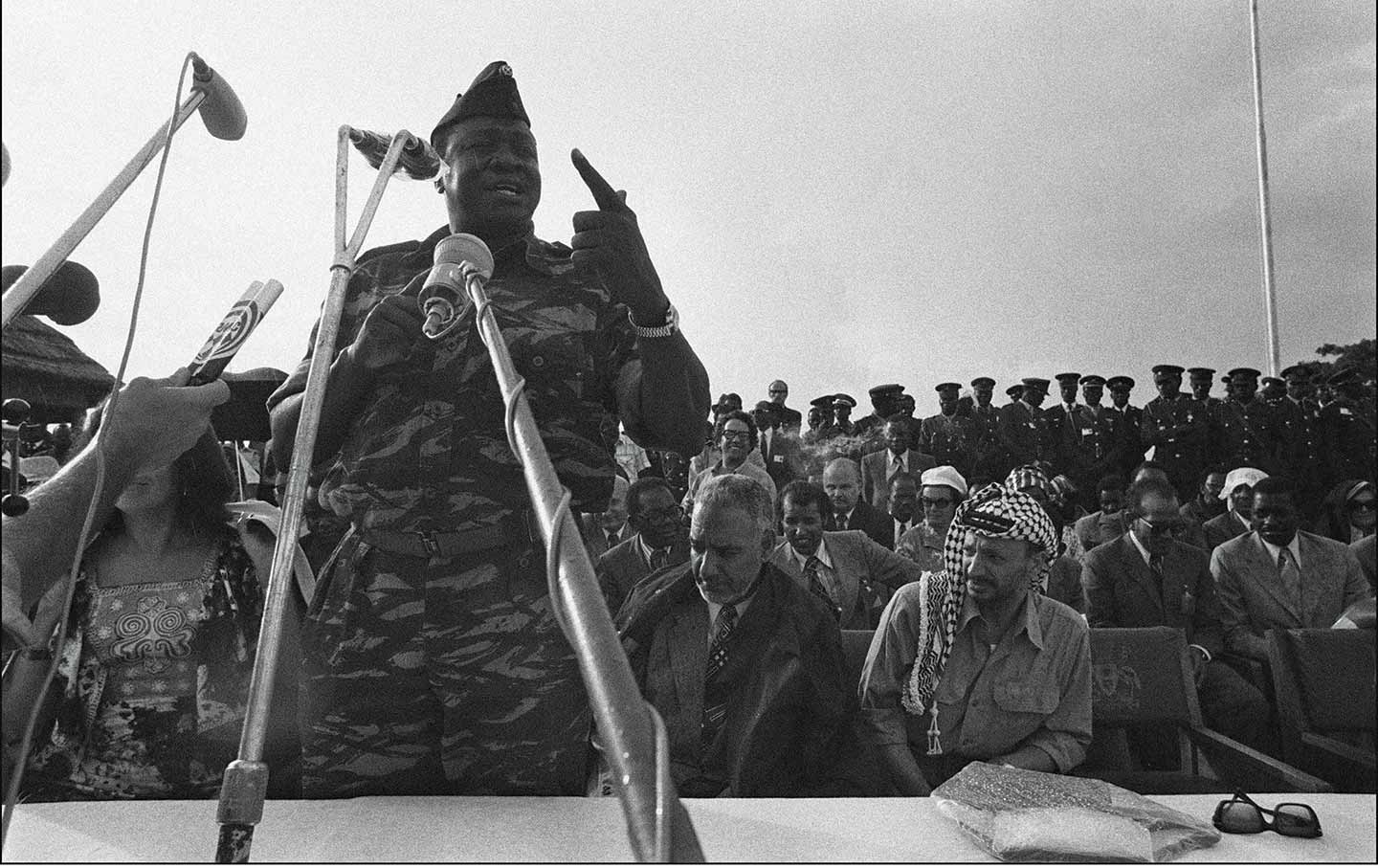Jonathan Glazer on Gaza and the Holocaust
Jewish self-defense or universal rights?

Accepting the Oscars awarded to his film The Zone of Interest, Jonathan Glazer said, referring to the colleagues who joined him on stage, “We stand here as men who refute their Jewishness and the Holocaust being hijacked by an occupation, which has led to conflict for so many innocent people. Whether the victims of October the 7th in Israel or the ongoing attack on Gaza, all [are] victims of this dehumanization.” This remark sparked heated accusations. In a March 11 open letter to Glazer, the chairman of the Holocaust Survivor’s Foundation USA (HSF), David Schaecter, wrote: “You should be ashamed of yourself for using Auschwitz to criticize Israel.” Anti-Defamation League CEO Jonathan Greenblatt responded, “Israel is not hijacking anyone’s Jewishness. It’s defending every Jew’s right to exist.”
These are just two examples of how Israel’s defenders treat charges that Israel has committed war crimes or worse in its campaign in Gaza as “misappropriation” or “minimization” of the Holocaust. During the UN General Assembly debate of November 26, 1947, on the resolution to partition Palestine, the representative of Uruguay asked rhetorically, “Why is it necessary that there should be a Jewish State?” In his answer he said,
What a burden of suffering [the Jewish people] have borne! No one in our day has endured such a burden. Nazism came and inaugurated a regime, not merely of racial persecution, but of racial extermination … the concentration camps, the gas chambers, the crematoria, claiming four million victims, sacrificed alive.
But the founding of the State of Israel was not the sole international response to the Holocaust. At least equally important was the codification in international law of the crimes that constituted the Holocaust, including war crimes, crimes against humanity, and genocide. And as Philippe Sands shows in his book East West Street, the intellectual authors of these concepts were Hersch Lauterpacht and Rafael Lemkin, two Jewish legal scholars educated in Lviv, now in Ukraine. Lauterpacht, Lemkin, and the maternal grandfather of Sands all grew up in Wołkowysk, a village near Lviv. Their many relatives who remained there were all killed by the Nazis.
In the summer of 1944, at Cambridge University, Lauterpacht drafted the statute for the Nuremberg tribunal in consultation with the tribunal’s lead prosecutor, Robert H. Jackson. The statute defined war crimes to “include, but not be limited to, murder, ill-treatment or deportation…of civilian population of or in occupied territory, murder or ill-treatment of prisoners of war, killing of hostages, plunder of public or private property, wanton destruction of cities, towns or villages, or devastation not justified by military necessity.”
Lauterpacht also persuaded Jackson to include in the Nuremberg statute a new concept he had developed, “crimes against humanity.” Those included “murder, extermination, enslavement, deportation, and other inhumane acts committed against any civilian population, before or during the war, or persecutions on political, racial or religious grounds in execution of or in connection with any crime within the jurisdiction of the Tribunal.”
Lauterpacht focused on preventing and punishing crimes against individuals. Lemkin, however, in a book published in 1944 while he was at Columbia University, coined the word “genocide,” to designate the destruction of groups. In December 1946 the UN General Assembly affirmed that “genocide is a crime under international law.” In 1948 the General Assembly adopted Lemkin’s proposal for a “Convention on the Prevention and Punishment of the Crime of Genocide.”
As Sands shows, Lemkin “made clear that he was concerned with the destruction of any group, not just Jews…. To stress ‘only the Jewish aspect’ would offer an invitation for genocide defendants ‘to use the court for anti-Semitic propaganda.’ The charge of genocide had to be part of a broader strategy, to show its perpetrators as enemies of mankind, a ‘specially dangerous crime.’”
War crimes and crimes against humanity were also codified in the Geneva conventions of 1949 and three subsequent optional protocols.
On January 26, 2024, the International Court of Justice, also founded after World War II in accord with the Charter of the United Nations, ruled in response to a petition by South Africa that there is “plausible” evidence that in Gaza Israel has committed acts of genocide as defined by the Convention: “killing, causing serious bodily and mental harm, inflicting on the group conditions of life calculated to bring about its physical destruction in whole or in part, and imposing measures intended to prevent births within the group.”
The court also ruled that “the intentional failure of the Government of Israel to condemn, prevent and punish…genocidal incitement constitutes in itself a grave violation of the Genocide Convention.” The court cited statements of a multitude of Israeli officials, from the Prime Minister and President on down, as evidence of “intent” to destroy the Palestinians of Gaza “in whole or in part.”
The International Criminal Court, which has jurisdiction over war crimes and crimes against humanity, has yet to rule on Israel’s actions in Gaza, but the daily deluge of videos and testimonies of killings, plunder, “wanton destruction of cities, towns or villages,” attacks on the food supply, health care personnel, patients, journalists, teachers, professors, schools, and universities; the public humiliation of prisoners; and the publicly announced plan to displace over a million already displaced Gazans to a yet-unknown destination, make it more than “plausible” that Israel is committing war crimes and crimes against humanity.
Lauterpacht and Lemkin developed fundamental components of international humanitarian law while in refuge in Britain and the United States, even as they had no news of what had happened to the families they had left behind. In Nuremberg they tried—Lauterpacht from the inside and Lemkin from the outside—to shape the cases against Nazi officials accused of the crimes that were engulfing their families.
As the trials approached their end, in the summer of 1945, a trickle of survivors from the East brought tales of the fates of those left behind. In September 1945, Lemkin learned that his parents, Bella and Jozef, had been deported to the Treblinka extermination camp. Early in 1946 Lauterpacht received a letter informing him that his family’s only survivor was his niece Inka, who had made it to Palestine.
Sands’ grandfather died in 1997 without learning what had happened to his family. Only in 2010, during a visit to Wołkowysk, did Sands learn that on March 25, 1943, German soldiers in the village had rounded up 3,500 Jews including about 70 of his grandfather’s relatives, marched them into the woods, shot them, and left their bodies in sand pits.
Sands became an internationally renowned legal scholar and author, based at University College London. As a prominent scholar and practitioner of international humanitarian law, he has worked on cases on the former Yugoslavia, the Congo, Libya, Afghanistan, Chechnya, Iran, Syria, Lebanon, Sierra Leone, Guantánamo, and Iraq.
Popular
“swipe left below to view more authors”Swipe →On February 19, 2024, Sands stood before the bench of the International Court of Justice in the Hague as the representative of the State of Palestine, challenging the legality of Israel’s occupation of the territories captured in 1967.
Sands concluded his intervention saying that “The occupation is illegal and must be brought to an immediate unconditional and total end,” and that “all UN members are obliged by law to end Israel’s presence on the territory of Palestine.” The court has confirmed, he added, that “the Palestinian people have a right to self-determination…which is not and can never be a matter of negotiation.”
Sands did not note, nor did he need to, that neither the genocide convention nor any other provision of international law grants an exemption from accountability to victims of past crimes or to those fighting others who have committed such crimes. When the Holocaust is used to justify defiance of humanitarian law, it is indeed being “hijacked,” just as Glazer said. Seeking to enforce provisions of international law that were enacted to prevent events like the Holocaust is an appropriate way to honor its memory.
Disobey authoritarians, support The Nation
Over the past year you’ve read Nation writers like Elie Mystal, Kaveh Akbar, John Nichols, Joan Walsh, Bryce Covert, Dave Zirin, Jeet Heer, Michael T. Klare, Katha Pollitt, Amy Littlefield, Gregg Gonsalves, and Sasha Abramsky take on the Trump family’s corruption, set the record straight about Robert F. Kennedy Jr.’s catastrophic Make America Healthy Again movement, survey the fallout and human cost of the DOGE wrecking ball, anticipate the Supreme Court’s dangerous antidemocratic rulings, and amplify successful tactics of resistance on the streets and in Congress.
We publish these stories because when members of our communities are being abducted, household debt is climbing, and AI data centers are causing water and electricity shortages, we have a duty as journalists to do all we can to inform the public.
In 2026, our aim is to do more than ever before—but we need your support to make that happen.
Through December 31, a generous donor will match all donations up to $75,000. That means that your contribution will be doubled, dollar for dollar. If we hit the full match, we’ll be starting 2026 with $150,000 to invest in the stories that impact real people’s lives—the kinds of stories that billionaire-owned, corporate-backed outlets aren’t covering.
With your support, our team will publish major stories that the president and his allies won’t want you to read. We’ll cover the emerging military-tech industrial complex and matters of war, peace, and surveillance, as well as the affordability crisis, hunger, housing, healthcare, the environment, attacks on reproductive rights, and much more. At the same time, we’ll imagine alternatives to Trumpian rule and uplift efforts to create a better world, here and now.
While your gift has twice the impact, I’m asking you to support The Nation with a donation today. You’ll empower the journalists, editors, and fact-checkers best equipped to hold this authoritarian administration to account.
I hope you won’t miss this moment—donate to The Nation today.
Onward,
Katrina vanden Heuvel
Editor and publisher, The Nation
More from The Nation

Chile at the Crossroads Chile at the Crossroads
A dramatic shift to the extreme right threatens the future—and past—for human rights and accountability.

The New Europeans, Trump-Style The New Europeans, Trump-Style
Donald Trump is sowing division in the European Union, even as he calls on it to spend more on defense.

The United States’ Hidden History of Regime Change—Revisited The United States’ Hidden History of Regime Change—Revisited
The truculent trio—Trump, Hegseth, and Rubio—do Venezuela.

Mahmood Mamdani’s Uganda Mahmood Mamdani’s Uganda
In his new book Slow Poison, the accomplished anthropologist revisits the Idi Amin and Yoweri Museveni years.

The US Is Looking More Like Putin’s Russia Every Day The US Is Looking More Like Putin’s Russia Every Day
We may already be on a superhighway to the sort of class- and race-stratified autocracy that it took Russia so many years to become after the Soviet Union collapsed.

Israel Wants to Destroy My Family's Way of Life. We'll Never Give In. Israel Wants to Destroy My Family's Way of Life. We'll Never Give In.
My family's olive trees have stood in Gaza for decades. Despite genocide, drought, pollution, toxic mines, uprooting, bulldozing, and burning, they're still here—and so are we.


